#noir tabletop game
Explore tagged Tumblr posts
Text

We've just published a Pay-What-You-Want anthology of art to be used in a wide variety of tabletop RPG settings!
The anthology also includes character bios for the detectives in our RPG, Soot: Tales of Tenebrous. Why not grab the anthology and use the pics inside for your next campaign! And while you're there, check out Soot: https://preview.drivethrurpg.com/en/product/441496/Soot-Tales-of-Tenebrous?affiliate_id=40693
#also we've designed a new logo#its the one in this post#what do you think?#soot: tales of tenebrous#soot#ttrpg#rpg#noir#noir tabletop game#indie ttrpg#tabletop game#sale#sale announcement#art#rpg art#art anthology
18 notes
·
View notes
Text
Please feel free to check out our blog! Soot: Tales of Tenebrous is a fully realised ttrpg system focused on mystery and investigation, with a brand new occult-themed setting to go with it
Alright, it has been 7 months, time to make a callout for any indie ttrpg creators that wants more attention and spotlight on their creations!
Whoever wants to get their stuff promoted, post it below, I might even make a review video on it!
410 notes
·
View notes
Text
Yes, it has dolls.
Yes, it has vore.
Yes, it has themes and motifs.
YES, it has the only "sanity" mechanic I have ever seen in a tabletop game or OTHERWISE that effectively and meaningfully portrays the way compounding stress effects someone. But what TRULY elevates it to a master piece is the fact that, YES! It, with a single mechanic, fixes the problem nearly every other ttrpg which thinks it can handle mysteries struggles with.
I am not exaggerating when I tell you I wholeheartedly believe that A.N.I.M.'s Eureka will be the next indie darling in the TTRPG scene.
https://anim-ttrpg.itch.io/eureka-urban-investigative-fantasy-ttrpg
The window to say you "liked it before it was cool" is quickly closing. Click the link.
#eureka: investigative urban fantasy#indie ttrpg#ttrpg community#eureka#ttrpg#tabletop#indie rpg#indie games#indie roleplay#living doll#tabletop roleplaying#roleplaying games#A.N.I.M.#mystery#noir#mystery rp#dnd#dungeons and dragons#5e#this has been sitting in my drafts for ages sorry for the delay
379 notes
·
View notes
Note
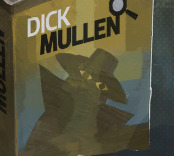
was the snoop design inspired in any way by the cover of the dick mullen book from disco elysium?
More likely, the Dick Mullen book cover was inspired by the same thing that the snoop designs for Eureka were inspired by, which is the 1940s and 1950s caracture of a "shady guy" which intersects with the idea of like crime and espianage. The most common example you'll see today is the "neighborhood watch" sign.
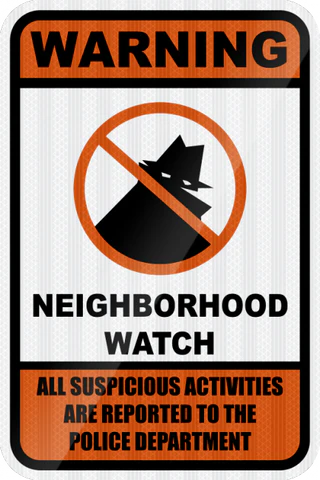
#ttrpg#indie ttrpgs#indie rpg#indie game#indie ttrpg#ttrpg design#ttrpg character#ttrpg tumblr#ttrpg community#ttrpg art#rpg#tabletop#artists on tumblr#roleplaying#ttrpgs#free ttrpgs#free ttrpg#free rpg#free game#film noir#eureka#eureka: investigative urban fantasy
254 notes
·
View notes
Text
Objectionable
(An Ace Attorney-inspired custom Trait for Eureka: Investigative Urban Fantasy, an excellent indie tabletop RPG by the good folks over at @anim-ttrpgs)

Once per Scene, when this Investigator proves that another character is lying or hiding relevant information, they gain 1 Investigation Point and a +1 Contextual Bonus on subsequent Interpersonal rolls to uncover further details about that untruth. During these lines of questioning, if another character finds a flaw in their logic, the Investigator takes a Composure roll with a +1 modifier, and their Interpersonal Bonus ends. [1]
[1] Investigators with this Trait emulate the tactics of scrappy defense attorneys from a certain series of courtroom drama visual novels. By finding contradictory details in the stories of others, they can pull apart an entire testimony at the seams, but if they take too big of a logical leap and can’t back it up, they quickly lose confidence, momentum, and the trust of onlookers.
Each Investigator (player character) has 3-6 Traits which mechanically represent various aspects of their character.
More information about Eureka and its mechanics under the cut!
Eureka is among my favorite RPGs I've ever read, and certainly the best investigation-focused system I've seen. Its systems are deeply elegant, creating a game where players can piece together mysteries alongside their Investigators in a grounded world that still leaves space for supernatural intrigue. Combat is swift and strategic, but deadly if you go in without a plan. Investigations can be complex, but even the stickiest of situations don't require railroading to keep players on track. Mundane and supernatural characters alike have access to unique abilities, quirks, and skills that make each character feel distinct in mechanics as much as in flavor. The game interacts with the real world by way of fiction in a way that's refreshing and endlessly fascinating.
I absolutely recommend you give Eureka a shot, especially if you've been disappointed trying to run mystery stories in systems like D&D5e.
This trait, as is probably clear from the art and description, is heavily inspired by the gameplay of the Ace Attorney franchise, where you're expected to pull at the threads of a story until the truth falls into your lap, but where every further question is a risk. This is part of a broader trend in the rulebook where traits reference investigators from other mystery media, including Columbo, Sherlock Holmes, Jacques Clouseau, Kolchak, and the Scooby Gang (two links), among others.
The text of Objectionable references "Investigation Points", which are an abstract representation of how well an Investigator understands the mystery they're looking into. They can be traded in for "Eureka!" moments, which allow Investigators to retroactively learn information from a previously failed roll or increase their chances on a future roll. Getting a bonus point in this case encourages players to use this Trait whenever it's applicable, and represents the growing confidence of the Investigator as they get to the bottom of the other person's story.
It also refers to Composure, which is kind of like an emotional HP system – having low Composure reduces the possible skill bonuses an Investigator can receive on a roll, because if they're scared, tired, hungry, frustrated, or otherwise thrown off their game, they're less likely to succeed at what they try to do. In this case, the potential loss of composure references Ace Attorney characters getting flustered and embarrassed when the player chooses the wrong line of inquiry.
I'm not affiliated with ANIM (other than being acquainted with their team, since they're quite active within their online communities), but I really do suggest supporting them on Patreon and/or itch.io and/or Ko-Fi. On top of making Eureka, they also run a TTRPG Book Club server on Discord, which is excellent for finding RPGs to read and play and people to read and play them with, and they already have other projects planned after Eureka's full release. There's also a free beta version of Eureka available on their itch.io page, on top of the more frequent updates available on Patreon. Go check out cool artists!
#eureka: investigative urban fantasy#indie ttrpg#ttrpg design#ttrpg#tabletop roleplaying#tabletop games#tabletop gaming#tabletop#ttrpg art#dnd#d&d#queer art#detective#mystery#phoenix wright#ace attorney#phoenix wright ace attorney#my fanart#eureka#urban fantasy#noir#neo noir
87 notes
·
View notes
Text
I'm the lead artist for the (published!) mystery/noir supernatural RPG system- Soot: Tales of Tenebrous!
Check out this Tumblr to learn more!
Y'all working on any games out there?
I wanna hear about them!
558 notes
·
View notes
Note
do you know any games that would fit a film noir detective style game? especially one with a gilded age or art deco aesthetic
THEME: Film Noir
Hello friend! So I knew of one or two games - but my buddy Sean, well he knows way more. Most of the games on this list are games that he’s introduced me to or knows about. So shout out to Sean!
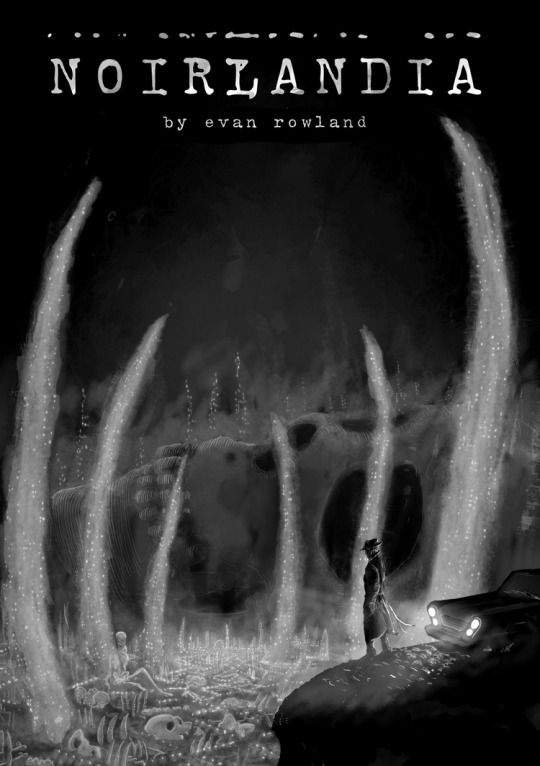



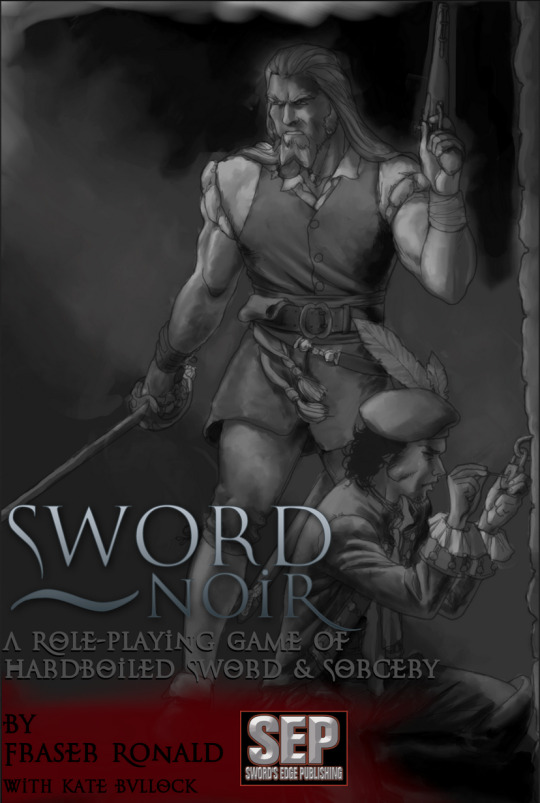
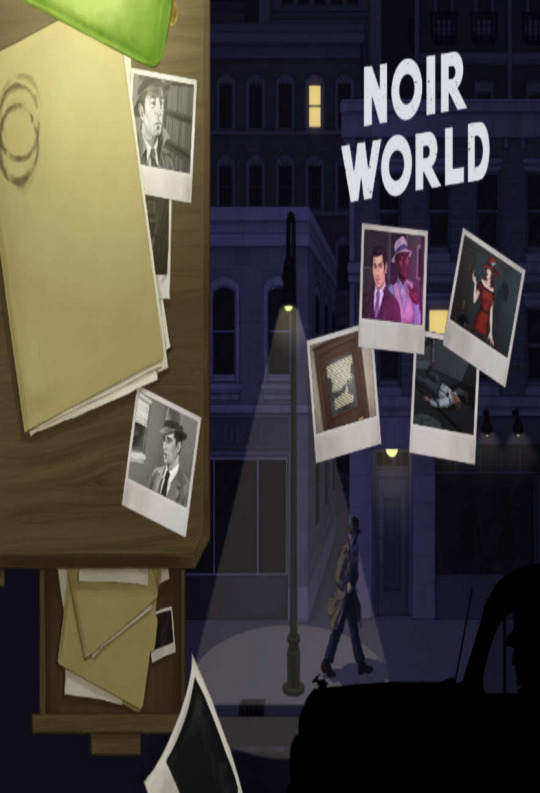

Noirlandia, by Turtlebun.
Noirlandia is a murder mystery roleplaying game played with an actual cork board. When you first sit down, no one knows the answers.
You'll figure out the way your city ticks—maybe it’s blanketed in white ash, maybe it’s built atop the back of an enormous dying beetle, maybe only a few non-synthetics remain.
Your story follows a group of interconnected characters, a mind-bending case, and the cold stiff that started it all. Roll well, and you'll be allowed to pin new leads to your cork board or string connections between them.
Find the truth, or lose yourself trying. It’s just another day in Noirlandia.
A GM-less game, Noirlandia sets up each of your characters as someone who is connected to the victim - someone who demands justice in a world that has none. The city is created by the players, which tells me that you can decide some details about what the city looks like. The city itself feels like a character in this game - it has defined sections that you build using a deck of cards, each with a distinct personality and a host of slang words.
Because this game is GM-less, everyone gets to participate in the construction of the mystery, from who the victim is, to why their characters are involved. If you like world-building as much as you like following a story, you’ll want to check out Noirlandia.
Urban Jungle, by Sanguine Productions.
The early 20th century of the United States was rife with fantastic change: from the rise of industry giants, to the great experiment of Prohibition, to the tragedy of the Great Depression, onto the dawn of the Atomic Age. The sky was tamed, the world was mapped, and the possibilities of science seemed limitless, all blue skies and buttered toast…
… for some folks, anyway.
A complete game in one volume, URBAN JUNGLE makes you a player in an anthropomorphic world of pulp-adventure, hard-boiled crime, and film noir. You’ll tangle with hardened gangsters, with jaded debutantes, with world-weary veterans, and with all kinds of shady characters.
Urban Jungle uses different sizes of dice to determine your level of skill. Character creation consists of distributing dice amongst your traits, and then choosing from a list of species, types, careers, and personalities. The type and career options open up a wide variety of backgrounds for your characters - you don’t necessarily have to be hard-boiled detectives. You could be a criminal, an artist, a member of the social elite, or a down-to-earth labourer of some kind, just to name a few. As a result, the differences between the characters in Urban Jungle could lead to a rather mis-matched party, so you’ll likely want to talk with your group about what kind of story you’re telling.
Judging by the skills available in this game, you’re likely going to begetting in and out of scrapes, chasing, running, fighting and investigating. You might tussle with the mafia, or hunt down missing artifacts. You might try to get inside a swanky party, or try to win at a game of cards. If what you want is a toolbox to create your own plots with, you might be interested in Urban Jungle.
Junk Noir, by JadeRavens.
Junk Noir is a cooperative, zero-prep, GM-less mystery game for 2 or more players. Players share control of Tracer as the titular robo-sleuth investigates mysteries, visits Locations, meets Characters, finds Clues, and triggers Events. In Junk Noir, you'll dramatize scenes, form connections, make moves, and play to see what happens!
Junk Noir mysteries don't come with pre-written solutions — that's the detective's job! Solving a mystery is about more than just finding clues, since clues are only as good as the theory that connects them. Players connect the dots and discuss theories over the course of an investigation.
This is a game for folks who like generative mysteries, such as Brindlewood Bay or Paranormal Inc. Junk Noir helps you generate clues that you as a group will have to put together, while each player embodies a part of Tracer’s programming. This is also a GM-less mystery game, which means you can all sit down and play with no prep required - the game will guide you as you play it.
Deadlands Noir, by Pinnacle Entertainment.
New Orleans, 1935. Whoever called this “the Big Easy” sure got that one wrong. Things are tough all over. Honest work is hard to find, and even dishonest jobs are getting scarce. The one thing that’s not in short supply is trouble. From shady thugs to crooked cops to Mafia soldiers, there’s plenty of characters out there looking to give an honest Joe a hard time. And that’s not the worst of it.
There are stories going round about things that go bump in the night. Things you wouldn’t want to meet in a dark alley on a darker night. And those stories aren’t just coming from rummies or saps who read that Epitaph rag.
Still, there are a few heroes left in the concrete jungle. Steely-eyed private dicks, fast-talking grifters, wild-eyed inventors, and shadowy houngans still struggle against the encroaching darkness. With enough moxie—and more than a little luck—they might just be enough to turn the tide.
Deadlands Noir is a pen-and-paper roleplaying game set in the world of Pinnacle Entertainment’s award-winning Deadlands universe. It includes new Edges, Hindrances, and powers, as well as new rules for handling detective work, the state of the Union and the CSA in the Depression-era, a complete Plot Point campaign, and of course, more monsters and ghouls than you can shake a smoking .45 automatic at.
Savage Worlds is a great system for pulp-action and protagonists that are good at what they do. Deadlands Noir is a setting for Savage Worlds, meaning you’ll need the core rulebook in order to use it. The Deadlands setting as a number of books that relate to each-other, including a Weird West and a Hell on Earth setting. This means that this version of Noir includes a supernatural element, and the people behind any big upset could have magical powers. The setting itself is based on the New Orleans that often shows up in popular media, with hauntings and monsters turned up to 11. If you want something paranormal mixed up in your noir, this is the game for you!
Sword Noir 2e, by Sword’s Edge Publishing.
Imagine a barbarian prince embroiled in the criminal underworld of a cosmopolitan city as they seek for an artifact in the shape of a falcon statue. Consider two accomplished thieves—one an urbane duelist and the other a brawny skald—hired by a wealthy retired general to deal with a blackmailer, only uncover multiple murders tied to the general’s children. Envision hardboiled crime fiction in the worlds of sword & sorcery.
That’s Sword Noir.
The concept of Sword Noir is a combination of hardboiled fiction, the film noir it inspired, and sword & sorcery. The setting is noir while the characters are drawn from sword & sorcery tales. The PCs live in a world filled with injustice and apathy. Treachery and greed dominate and hope is frail. Violence is deadly and fast. The characters are good at what they do. They are specialists. Trust is the most valued of commodities—life is the cheapest. Grim leaders weave labyrinthine plots which entangle innocents. Magic is real and can be powerful, but it takes extreme dedication to learn, extorts a horrible price, and is slow to conjure.Now is the time for your characters to walk down mean streets, drenched in rain, hidden in fog, and unravel mysteries, murders, and villainy.
Sword Noir is probably the biggest step from the original noir trope, placing your characters in a fantasy world, far removed from technology like telephones or sleek cars. However, the corrupted city still lives and breathes here, full of ne’er-do-wells and shady characters. If you want to revel in noir tropes but play with the setting a little, maybe try out Sword Noir 2e.
Noir World, by John Adamus.
WALK THESE STREETS. TELL YOUR STORY. MAKE YOUR MOVIE.
It’s raining. The alleys are as dark as the streets. You’ve entered a world where light and dark mix with gray and the unknown, where your past collides with your present and future, and it’s safe to assume everyone’s out for themselves.
It’s the stuff dreams are made of, it’s the stuff of old movies, classic movies. Great stories.
This is Noir World. And this is your world and your Movie now. Your story is worth telling, even though it’s not going to be pretty. You might not make it out alive, but it’ll be one hell of a ride.
It’s true what they say: the City is full of stories, and not all of them have happy endings.
As a PbtA game, Noir World calls back to Apocalypse World, Monsterhearts, and The Sprawl as sources of inspiration. This means that you’ll be building your setting together, using noir tropes as guides to construct the story you want to tell. If this game is anything like its’ predecessors, the primary thing you’ll be focusing on is relationships; what do your characters mean to each-other, and how do those relationships affect their ability to get what they want?
Fedora Noir, by Less Than Three Games.
In Fedora Noir, you create the story of a flawed private investigator in the style of a film noir. Players take on the roles of the Detective, their Partner, their Flame – and their Hat, the Detective’s sharp mind and inner voice. Together, players explore the Detective’s messy life against the backdrop of a difficult case.
In Fedora Noir, two players share control of the story’s main character: the Detective and the Hat.
The Detective role-plays a private eye on a case, narrating their actions and speech. But here’s the catch – the person role-playing the Detective doesn’t get to say what they think. That’s the Hat’s job. The other two main characters – the Partner and the Flame – provide the Detective with personal relationships. People to care about… or disappoint.
Fedora Noir is a game for exactly four players. It takes the form of a deck of cards, which provide prompts and references to help you navigate the story - great for folks who don’t want to keep track of character sheets. There’s a whole bunch of settings included - and if you want the art deco style, then the New Hudson setting is made for you. Each city comes with a piece of art to set the mood, a list of locations you can choose to visit, and a cast of characters that may be getting involved in the case. You also choose a Case card to represent the Detective’s mission, Actor cards to help you depict what your detective looks like, and a series of chapter cards that will bring you through the narrative beats of a detective novel.
Other Games to Check Out...
Hardboiled, by Fat Goblin Games.
Noire: Elle Est, Elles Sont, by Ursidice.
Nitrate City, by Evil Hat.
76 notes
·
View notes
Text
5 books for adventuring in Mists of Akuma just launched on Kickstarter! Check out the project page for a 90-page preview PDF (for either D&D 5E or D&D 5.5E)
https://www.kickstarter.com/projects/verantheacodex/mists-of-akuma-5e-eastern-fantasy-noir-steampunk-bonanza
After its first Kickstarter project nearly a decade ago the Mists of Akuma eastern fantasy noir steampunk campaign setting is getting some serious love with an improved version that DOUBLES the size of the book, brings full color to all of its illustrations and trade dressing, and sports rebalanced statblocks along with tons of new items, archetypes, feats, and more!

Thinking about switching to the newest emerging edition of D&D? Every book in this Kickstarter is being offered for both D&D 5E and 5.5E (or whatever they end up calling it).
That’s only the start.
In addition to remaking the campaign setting book there’s a brand spanking new adventure path to take the party across Soburin: Beyond the Great Divide!

What’s on the other side of the Great Divide?

Nothing good! Nuclear fire has consumed the world outside of Soburin and this campaign setting generator is designed to guide GMs and their players through a wasteland of their own making. 2099 Wasteland can also stand on its own as a realm worthy of adventure and is fully equipped with custom classes, dozens of monsters and NPCs, hoards of new items, and everything else you could want to strike out into a nuclear apocalyptic campaign!

ENCOUNTERS!
GMs keen to embrace Mists of Akuma can add two volumes of 1st–20th level encounters to their toolbox, each with maps and new monsters or NPCs to spice up any campaign in Soburin.


#d&d#dungeons & dragons#tabletop rpg#gaming#kickstarter rpg#kickstarter#tabletop#dungeons and dragons#rpg#campaign setting#Mists of Akuma#eastern fantasy#noir#steampunk#dnd#d&d 5e#dnd 5e#adventure path#5E#dnd 2024
2 notes
·
View notes
Text
hey if you like ttrpgs here's some ttrpgs you should try out, especially if you've only played dnd -cyberpunk red: tense af action and a great setting -masks: teen titans simulator, playing as a young superhero team can lead to a lot of fun drama and action. if u dont like powered by the apocalypse i still recommend this one -lancer: tactical mech combat with lots of flexibility. you can also jockey a mech like in titanfall so automatically a win -city of mist: cool af neo-noir mystery ttrpg. Has one of the most flexible character creation systems i've ever seen with an even more flexible setting for your detective needs. -monsterhearts 2: Teen drama with monster people. I don't even have to explain this one it's just like riverdale but good -triangle agency: this isnt out yet but it's inspired by scp and x-files and you get to capture anomalies it's automatically cool. Look at the playtest books they're so fucking well made. there's more tabletop stuff out there but this is the stuff i have experience with or have read thoroughly. have fun becoming addicted to new systems.
#ttrpg#tabletop#ttrpg community#tabletop games#cyberpunk#cyberpunk red#powered by the apocalypse#lancer ttrpg#mech game#triangle agency#scp#neo noir#i have an addiction#not related to anything else i post i just love ttrpgs#literally about to run a cyberpunk session rn#dnd#dungeons and dragons#dnd 5e
16 notes
·
View notes
Text
Le Pelage Noir - A Game of Furry Detectives in a Furry Town
Step in paws of detectives in an anthro city. The streets might be cute and fluffy but watch out for crime hiding on them.
It's a day like every other. You and your partners are called to solve a nasty case. You have to use every trick you can to reveal the truth.
To create your character choose an animal you want to base them on. Then roll a D6 die three times for your statistics - Speech, Logic and Nature.
Speech helps you with interrogating NPCs.
Logic helps you stumble into theories about the case at hands.
Nature lets you use your animalistic abilities in solving the case.
If you have to test one of your stats you roll a D8 die. If the result of the roll is lower or equal to your stat then you succeed. Each PC does their actions in an order that is agreed upon at the start of the game (only one action per turn).
For progress in your case the game master can award you with Eureka Points. You can then spend it to find a clue that eludes you if there are any that you didn't find or to interrogate an NPC.
*************
So here's my entry for the jam! I have to say I love detective games both tabletop and digital. I hope you'll have fun playing my creation.
I counted the words using the counter provided by Elllipsus, so I don't know how accurate I am, but it showed a perfect 200 (not counting the title).
Oh, and of course I agree for joining the off-site archive.
Have fun playing!
200 Word RPGs 2024
Each November, some people try to write a novel. Others would prefer to do as little writing as possible. For those who wish to challenge their ability to not write, we offer this alternative: producing a complete, playable roleplaying game in two hundred words or fewer.
This is the submission thread for the 2024 event, running from November 1st, 2024 through November 30th, 2024. Submission guidelines can be found in this blog's pinned post, here.
#gaming#tabletop roleplaying#tabletop rpgs#game design#game jam#tumblr 200 word rpgs 2024#tumblr 200 word rpgs#200 word rpgs#furry#detective#noir#detective game#mystery games
14K notes
·
View notes
Text
Have you played DETECT OR DIE ?
By Ben Klug

I'm just going to let the game's blurb on itch speak for itself:
A tabletop RPG of neo-noir empiricism, unstable detectives, and total ego death & resurrection. Inspired by science fiction stories of memory and detection like Blade Runner (1982) and Disco Elysium (2019), Detect or Die places the players as the various inner voices of the Detective, collectively embodying the fractured psyche of an amnesiac protagonist attempting to solve the Case. One player takes on the role of the World, laying out the setting and mystery for the rest, using a bespoke variation of the Powered by the Apocalypse game engine influenced by Blades in the Dark and Bluebeard's Bride. The rest play Personality Components, the fragments of the Detective's Ego who combine investigative competencies with erratic coping mechanisms, trading off control and emotional stamina to make it through the Case to the ultimate revelations - about the World and about the Detective.
145 notes
·
View notes
Text
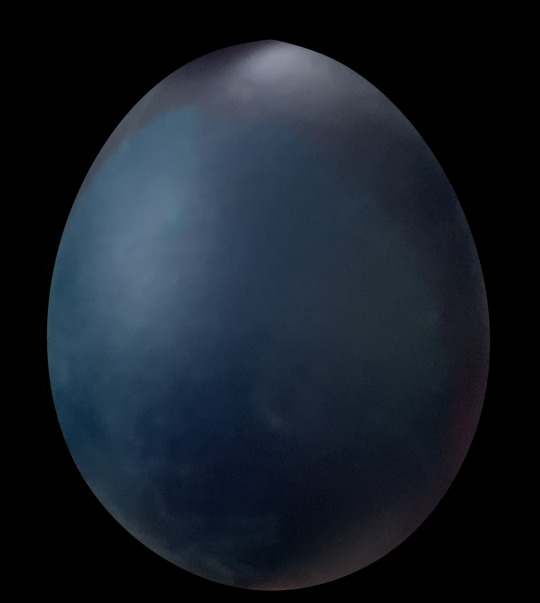
Happy Easter! Soot: Tales of Tenebrous is having a sale and painting very normal eggs!
Why not enjoy this bank holiday weekend by exploring a brand new, fully realised noir investigative RPG with a unique setting?
https://preview.drivethrurpg.com/en/product/441496/Soot-Tales-of-Tenebrous?affiliate_id=40693
#indie ttrpg#noir tabletop game#rpg#soot#soot: tales of tenebrous#tabletop game#ttrpg#noir#sale#sale announcement#egg time#a perfectly normal egg#don't worry about it#why are you worrying about it?#would you like an egg in this trying time?
6 notes
·
View notes
Note
So we all hate DnD, but I am kinda curious what are the actually bad ttrpgs?
I know that 3,5e and pf got bloated even more than 5e did, FATAL is a meme, but what else?
I think Chronicles of Darkness tell you the system's gonna be a sleek, streamlined narrative system and then immediately bukakke's pointless fiddly complexity all over everything, to an extent that I never see most STs actually use half the subsystems (does anybody actually like the Doors mechanic?) but also you can utterly break the game if you combine the right merits and powers in a way that I really hope isn't intentional. WoD games all have slightly clunky, lame mechanics but at least in OWoD the mechanics take an extremely simulationist approach of simply modeling the fiction, balance be damned; CoD throws out the simulationism in favour of abstraction and narrativism, but perversely only makes the mechanics more complex, and deploys more weird dice tricks so eyeballing probabilities gets much harder. Everything is fiddly, everything has specific exceptions, and everything good is gated behind weird prerequisites and builds as if the devs thought they were making pathfinder. If you're some sort of weirdo who actually prefers the CoD settings, run them using OWoD mechanics for the love of god.
Shadowrun 6e's character generation is so complex that people have created third party apps that are basically mandatory in order to wrangle it into shape. It's notoriously complex in play with basically every action requiring multiple steps of calculation, to the extent that 'you need to do calculus if you set off a grenade next to a wall' is a meme; when I played we simply never used grenades because we were all to scared of trying to make sense of the mechanics. However, in play a slightly minmaxed mage can make every other party member obsolete by simply summoning an extremely powerful spirit to solve every task. I hated every minute of it.
Pokemon Tabletop Adventures uses d20-based mechanics for trainers, where you roll a d20 vs armour class to hit, and then roll some damage. It also recreates the mechanics of the pokemon video games largely verbatim. Its expected that trainers and pokemon can and will interact despite using totally different systems, and trainers can even learn pokemon moves. Some classes are good at things like 'capturing and training pokemons' while others are good at 'fighting pokemons themselves with martial arts' or 'winning contests' or 'being a film noir detective', but you only get XP or mechanical support for the first ones. Some classes get abilities like 'perfect mind-control, no save' while others get abilities like 'you're better at growing berries'. You are expected to calculate the stats of every pokemon individually, from scratch, for every encounter. Encounters typically feature 5-10 wild pokemons often of multiple species and levels, alongside 3-5 player characters and up to six pokemons per PC. Its a fractal spreadsheet nightmare. Unlike shadowrun, the app to make this insanity playable doesn't exist. Good god. Send help.
On the other end of the spectrum from stupid fiddly crunch, Ten Candles is responsible for the single most miserable ttrpg experience of my life. It claims to be a narrative game which gives players the ability to define the fiction as they go, but fails at this because the GM has secret knowledge that other players aren't privy to, meaning that it invites players to be creatively vulnerable when they have narrative authority, with a chance that they might get their contributions unilaterally overruled due to information they had no way of knowing. Since the game ends with everybody dying automatically, the game inherently leans on the GM to railroad in what's meant to be a colaberative narrative experience. And finally, on a purely practical level, the clever conciet of playing by candlelight and extinguishing candles as the game progresses means that by half-way in you can't read your fucking character sheets or dice, which is less spooky and more irritating. God I hate ten candles.
64 notes
·
View notes
Text
About this blog!!
Hi! This is a sideblog for me to dump posts that remind me of Eureka: Investigative Urban Fantasy, an excellent system for tabletop mystery games developed by @anim-ttrpgs. Below the cut is information about Eureka, its creators, myself, and what to expect out of this blog.
What is Eureka?
Eureka: Investigative Urban Fantasy is an indie tabletop roleplaying game by the very talented team at @anim-ttrpgs, focused on providing mechanical support for stories where characters investigate mysteries, as well as allowing for the presence of supernatural phenomena and characters. In my opinion, it is the most elegant, cohesive, and interesting TTRPG system that I have ever read or played in terms of its mechanics, storytelling capabilities, and even its perspectives on society as a whole. This blog is, more or less, "propaganda" convincing people to give the game a shot – I'm not affiliated with its creators in any way other than being acquainted with them through their work and online communities, but I love the game and its community, and I'd love to see it succeed, so I want to share an idea of what it is and why I like it.
What makes Eureka such a great system?
A whole lot! Its systems are deeply elegant, creating a game where players can piece together mysteries alongside their investigators in a grounded world that still leaves space for supernatural intrigue. Combat is swift and strategic, but deadly if you go in without a plan. Investigations can be complex, but even the stickiest of situations don't require railroading to keep players on track. Mundane and supernatural characters alike have access to unique abilities, quirks, and skills that make each character feel distinct in mechanics as much as in flavor. The game interacts with the real world by way of fiction in a way that's refreshing and endlessly fascinating.
Systems like Eureka! moments (which allow investigators to retroactively learn information from a previously failed roll) and the streamlined character creation system allow the game to run smoothly and efficiently without getting overly bogged down, and mechanics like the Composure meter (representing an investigator's energy level and state of mind) and the Success/Partial Success/Failure resolution mechanic create an interesting element of risk where player choices matter a lot.
On top of all that, Eureka includes rules for supernatural characters that beautifully integrate the themes, traits, and abilities of classic folkloric or media monsters, making for intriguing secrets, hard choices, and a lot of variety in the gameplay of different investigators. (Most of this is already true of mundane non-supernatural characters, but it's carried through into the lens of vampires and other monsters very elegantly.)
I'd love to see the tabletop gaming scene as a whole take notes from Eureka's handling of a lot of different problems, and I'm constantly excited to see what their team comes up with next. If you ever want to run a mystery story in a tabletop game (especially if systems like D&D 5e have disappointed you on that front), I would seriously recommend Eureka as the game to use for that purpose, and if you're interested in the hobby at all, I would recommend reading Eureka as a way to get valuable insight into the thought process that goes into game design in the tabletop space.
What can I expect to see on this blog?
This blog is for basically any post I see that makes me think of Eureka. Most of the time, that includes references to the monsters and phenomena referenced in the rules about supernatural characters – posts about vampires, werewolves, witches, and alien shapeshifters, for example, are often right at home here. In particular, posts about these kinds of supernatural beings being normal people and living normal lives tend to remind me of Eureka. Other things that are reminiscent of Eureka include noir and neo-noir aesthetics, which the game owes a lot to, and popular detective media, which is ultimately its core inspiration.
Who runs this blog?
I'm Nora, my main blog is @mc-cookies, and I am just a fan of Eureka. I'm not directly affiliated with the creators (hell, they don't remotely have the budget to make me advertise for them), but they and the rest of the community are super nice people who have a lot of insight about the process of making and playing tabletop games.
Who makes Eureka, and how do I support them?
Eureka is an amazing game, and independent tabletop designers across the board do a ton of work to make art that I enjoy a lot, but unfortunately it's not the most welcoming market to be in. Wizards of the Coast, and by extension Hasbro, has what is effectively a monopoly on the TTRPG hobby in the form of D&D, and it's hard for new creators to break into the space because of that. Eureka is made by ANIM TTRPGs, a very small group of designers taking on a very large project. While they're gearing up for the full release of Eureka and preparing their next projects, any support is helpful to them.
To read Eureka, visit their itch.io page to download a fully playable beta version on a pay-what-you-can basis! Even free downloads can support the game by bumping Eureka on itch's algorithm and getting it recommended to more people.
To support ANIM more, consider subscribing to their Patreon, which will grant you access to more frequent updates of the Eureka beta, as well as concept art, previews of their future projects, and a community discord server.
To give on a one-time basis, use ANIM's ko-fi page to donate to them more directly. Right now they're also taking donations to add custom characters into the rulebook as possible random encounters, and ko-fi is the place to go for that!
If you just want to interact with the team at ANIM and learn more about the work that they're doing, give them a follow here on tumblr at @anim-ttrpgs – their blog has similar content to this one, as well as regularly posting excerpts of the rules, answering people's questions, and discussing the broader tabletop gaming hobby.
And last but certainly not least, ANIM also runs a TTRPG Book Club server on Discord, which is excellent for finding RPGs to read and play and people to read and play them with, and is a great place to interact with other people who are interested in indie TTRPGs (including ANIM's staff and other fans of their work).
What's the deal with your avatar?
That is a "snoop", a stylized human figure serving as the mascot of Eureka! Designed by @theblackwarden, these little guys appear throughout the rulebook to graphically represent various mechanics, and they're very fun designs. This one, in particular, represents the "anime wolfgirl", which is a humanoid form that wolfman (aka "loup-garou" or "Hollywood werewolf") investigators can take, reserving only their ears, tails, and claws.
I have more questions!
My ask box is open! Have fun checking out the other posts around this blog :)
37 notes
·
View notes
Text
Introducing: Urethra! Bad Traits for Bad Investigators
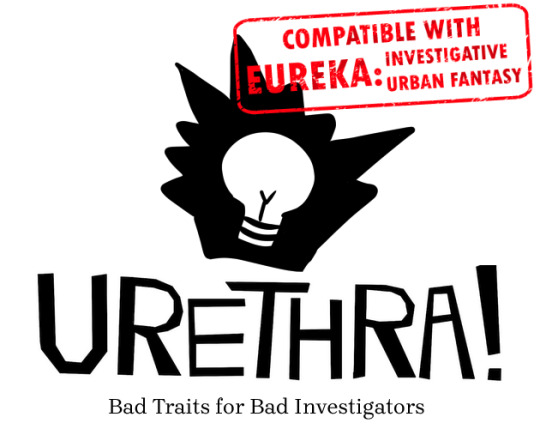
Available now on Itch, I have created a Pay-If-You-Must collection of 14 new traits for the HIT independently developed, critically acclaimed, urban fantasy noir mystery solving tabletop roleplaying game known only as Eureka: Investigative Urban Fantasy. The traits held within range from actively hindering, laughably specific, and even decently powerful (albeit with humorous presentation.) If you're a fan of Eureka, please help yourself to my little supplement, I guarantee it will at least bring you a chuckle. If you AREN'T already a fan of Eureka and you're seeing this post I BEG you, click the underlined link above or even right here. Believe me when I tell you Eureka is the TTRPG scene's next indie darling. Alright. PEACE.
#indie ttrpgs#eureka#eureka: investigative urban fantasy#ttrpg#indie ttrpg#homebrew#ttrpg supplement#roleplaying#urban fantasy#A.N.I.M.#Compatible with Eureka: Investigative Urban Fantasy#game design#ttrpg design#ttrpg community#ttrpg art#roleplaying games#As of this post I have officially solidified myself#and this shitpost of a fan supplement#as forever a part of Eureka history - by somehow managing to be the first fan supplement with any sort of official branding.
416 notes
·
View notes
Text


"Arithmomaniac," investigator Trait from Eureka: Investigative Urban Fantasy. Every investigator has 3 to 6 Traits!
#indie game#ttrpgs#ttrpg tumblr#indie ttrpg#ttrpg#ttrpg community#math#mathematics#mathblr#rpg#tabletop#roleplaying#neo noir#vampire#vampirism#vampires#urban fantasy#rpgs#free rpg#supernatural rpg#fantasy rpg#eureka#eureka: investigative urban fantasy
161 notes
·
View notes